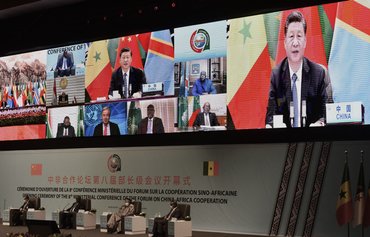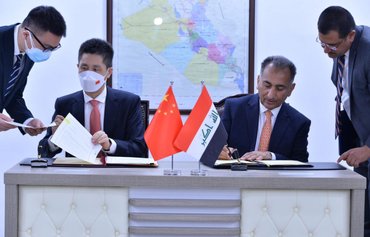CAIRO -- Though Egypt's economy has been buffeted by global economic headwinds, its government has not succumbed to China's attempts to impose its agenda on Cairo, experts told Al-Mashareq.
China has failed to penetrate the Egyptian political sphere and set conditions for investments or trade, they said, despite its concerted efforts in recent years to do so.
The best evidence of this is the modest volume of Chinese investments in Egypt compared to the volume of trade exchange between China and other Arab countries.
The amount of trade exchange between the two countries was $20 billion in 2022, only a small portion of the more than $300 billion worth of trade between China and other Arab countries, said journalist Zina Mahmoud, who follows Egyptian-Chinese relations.
![Arab League Secretary-General Ahmed Aboul-Gheit (C R) welcomes Chinese Foreign Minister Qin Gang (C L) and a delegation at the league's headquarters in Cairo on January 15. [AFP]](/cnmi_am/images/2023/04/06/41475-China-Arab-league-600_384.jpg)
Arab League Secretary-General Ahmed Aboul-Gheit (C R) welcomes Chinese Foreign Minister Qin Gang (C L) and a delegation at the league's headquarters in Cairo on January 15. [AFP]
China's investment in Egypt's petrochemical sector, through 21 Chinese companies, also does not exceed a relatively modest $280 million, she added.
The volume of economic co-operation and Chinese investment in Egypt is modest, Mahmoud said, considering that Egypt, with its population of some 110 million, is a large market for investment opportunities.
On the other hand, Cairo rejected the Chinese government's request that Egypt's state-owned assets be used as collateral for an electric train project connecting the new administrative capital to Cairo.
A ministerial committee reviewing foreign debt was established in February 2013 and is kept abreast of Chinese investment negotiations, according to a 2021 Chatham House report.
The committee's mandate is to avoid various ministries signing separate deals with Chinese entities and accumulating bad debt.
"The Egyptian government's refusal to place the state's assets as collateral in exchange for Chinese investments is the best evidence of China's intentions and Egypt's prudence," Mahmoud said.
It shows that Egypt has not lost its independence, she added.
Exaggerated Chinese influence
China has been attempting to gain greater access to Africa for years, and has sought to do so through Egypt via various means.
It has constructed or renovated nearly 200 government buildings in Africa, gifted computers to African governments and built "secure" telecommunications networks that enable it to conduct surveillance, per a 2020 Foreign Policy report.
Mahmoud said the Chinese government intends to infiltrate the Gulf region, Middle East and Africa.
China is trying to penetrate Africa through Egypt, she said, noting that because of the Suez Canal, Egypt is considered a strategic centre for the implementation of Beijing's Belt and Road Initiative (BRI), or One Belt One Road (OBOR).
"Despite the robust media activity by the Chinese side to portray the relationship with Egypt as outstanding, with a brilliant future, the truth is otherwise," said Cairo University Faculty of Economics and Political Sciences lecturer Ayman Ramzi.
The relationship between Egypt and China is controlled by many factors, particularly politics and strategy, he told Al-Mashareq.
Egypt is standing at the same distance from all countries and opening doors for investments and agreements, as long as these do not adversely affect its national interests or benefit one side of an agreement over another, Ramzi said.
This strategy is aligned with Egypt's current plan to attract foreign investment, in order to take full advantage of the recent advancements it has made in its infrastructure, he said.
Despite constant Chinese statements about assisting Egypt, offering investments and developing the bilateral relationship, the China International Development Co-operation Agency (CIDCA) has no Cairo office, Ramzi noted.
In most Western countries, these offices facilitate business activity, he said.
In Egypt, instead, there is a "single point person", the economic advisor at the Chinese embassy, according to the 2021 Chatham House report.
China appears to be satisfied with the presence of an economic advisor at its embassy, who does not have the power to make decisions, Ramzi said.
Meanwhile, the Chinese government is attempting to make inroads into Egypt's cultural and media scenes by opening offices for Chinese governmental press institutions and activating cultural centres in that country.
But the impact of such centres are minimal due to the cultural differences between the two nations, Ramzi said.

![Egyptian Foreign Minister Sameh Shoukry (R) greets his Chinese counterpart Qin Gang after a press conference in Cairo on January 15. [Khaled Desouki/AFP]](/cnmi_am/images/2023/04/06/41474-China-Egpyt-relations-600_384.jpg)







Wow! This is an anti-Chinese page, from top to bottom. Secondly, Saudi Arabia itself has signed huge contracts with China. Thirdly, Egypt is an [pro] American country with Western obligations and is not allowed to deal with China beyond a certain limit. If China is unfavourable, reckless, and dangerous, why is Saudi Arabia signing contracts with China one after another and spreading purple carpets under the feet of the Chinese president?
Reply1 Comment(s)